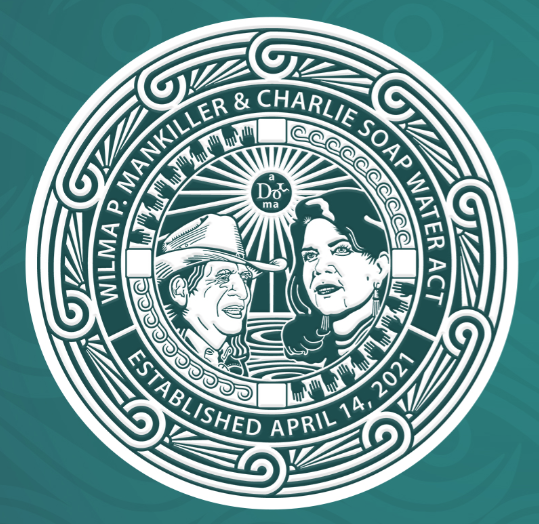
- Details
- By Chuck Hoskin Jr
Guest Opinion. Water is life. No one understood this better than former Principal Chief Wilma Mankiller and Charlie Soap. Together, they devoted themselves to the most essential work of all: connecting Cherokee families to clean, reliable water. Their leadership brought dignity, health, and opportunity to our communities in the 1980s.
To honor their visionary efforts and extend their legacy, we enacted the Wilma P. Mankiller and Charlie Soap Water Act in 2021. Four years later, we are proud of what we have accomplished, but we know there is still much work to do. While water systems can be complicated, the fundamentals of the Mankiller Soap Water Act are simple. Under this law, Cherokee Nation continually gathers feedback from our citizens, maps the water infrastructure of our homes and communities, and invests to close any gaps that we find.
Since the beginning of this effort, Cherokee Nation has surveyed nearly 2,000 citizens and examined 121 public water systems and 53 wastewater systems. So far, we have identified more than 8,000 homes lacking public water access and pinpointed the water and wastewater systems with the most deficiencies.

To date, Cherokee Nation has allocated $65 million for infrastructure improvements under this act, with $23.8 million already spent addressing critical projects. One of our proudest achievements is the $8.38 million invested to date in modernizing the Cherry Tree Water District, which serves communities closest to Chief Mankiller’s historic Bell water line project. This investment alone is bringing better water access to more than 800 Cherokee homes.
We are committed to investing even more in Cherry Tree. Working alongside the water district board and strong local advocates like Cherokee Council member Josh Sam I know we can fully modernize the district and keep it on sound footing for generations to come.
Our efforts aren’t stopping there. From a new water tower under construction in Nowata to repairs across our reservation’s most underserved areas, the Mankiller Soap Water Act is delivering overdue improvements. Beginning this year, we are increasing funding for the act with an additional $500,000.
But infrastructure is only one part of the difference the act is making. It also provides direct support to Cherokee families through water utility assistance that has helped more than 500 elders and families avoid difficult choices between water access and other necessities. A $25,000 fund supports water tap installations in our new home construction program, and we’ve identified 120 households with the most urgent needs, connecting them to safe water access for the very first time.
These changes represent something deeper for us as Cherokee people, as water is more than just a resource. It is a sacred, connecting to our health, our culture and our future.
The Mankiller Soap Water Act is a continuation of our Cherokee values because it honors the principle of gadugi, working together for the common good. It builds on the ethos that Wilma Mankiller and Charlie Soap exemplified so boldly. And it demonstrates that we, as a Nation, take action to ensure the health and safety of our citizens.
Just as Wilma and Charlie once traveled across our communities to ensure that no Cherokee family was left behind, we continue to gather data through surveys. We learn directly from Cherokees about where water access is lacking. These insights help guide every decision we make.
Looking ahead, the work is far from complete. We have committed $2 million annually from the general fund to continue the work. Additional investments, including $500,000 from the Public Health and Wellness Fund, will further expand our ability to reach families in need of safe water.
It is a promise that, no matter how remote or underserved, every Cherokee family matters.
As part of our commitment to transparency and public engagement we have issued our latest biennial report, a requirement of the Mankiller Soap Water Act, on our website cherokee.org.
The Wilma P. Mankiller and Charlie Soap Water Act has made an impact we can measure in miles of water lines, gallons of clean water, and homes served. But the deeper impact is seen in the faces of families who turn on a faucet and trust what flows, knowing their Nation has invested in them. It is reflected in the smiles of children who can bathe safely and in elders who no longer worry if their utility bills will stretch far enough.
Building on the legacy of Wilma Mankiller and Charlie Soap means more than improving water access, it’s about empowering our people. Water truly is life, and in Cherokee Nation, we will continue to honor that truth for future generations.
Chuck Hoskin, Jr. is the principal chief of the Cherokee Nation.
More Stories Like This
Law Should Not Get in the Way When "Manifest-ing Destiny"Celebrating 35 Years of Gaming Success
My Tribe’s ICE Contract Betrayed Our Values
Extending the Affordable Care Act Is a Moral Imperative for Indian Country
All Is Fair in … War?
Help us defend tribal sovereignty.
At Native News Online, our mission is rooted in telling the stories that strengthen sovereignty and uplift Indigenous voices — not just at year’s end, but every single day.
Because of your generosity last year, we were able to keep our reporters on the ground in tribal communities, at national gatherings and in the halls of Congress — covering the issues that matter most to Indian Country: sovereignty, culture, education, health and economic opportunity.
That support sustained us through a tough year in 2025. Now, as we look to the year ahead, we need your help right now to ensure warrior journalism remains strong — reporting that defends tribal sovereignty, amplifies Native truth, and holds power accountable.
 The stakes couldn't be higher. Your support keeps Native voices heard, Native stories told and Native sovereignty defended.
The stakes couldn't be higher. Your support keeps Native voices heard, Native stories told and Native sovereignty defended.
Stand with Warrior Journalism today.
Levi Rickert (Potawatomi), Editor & Publisher

